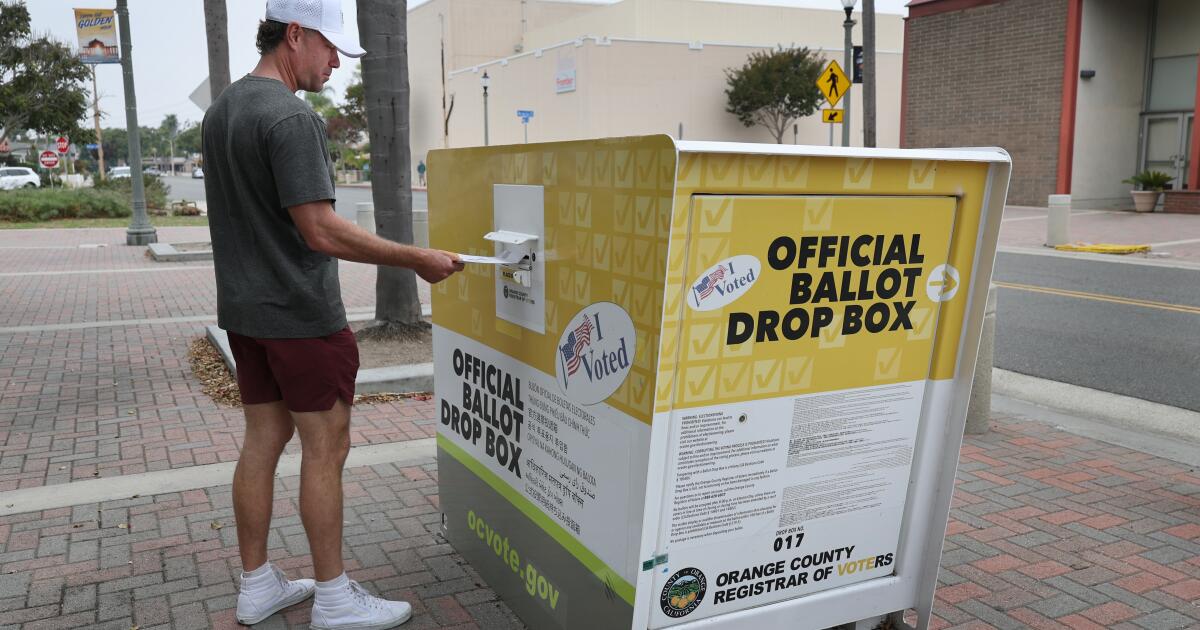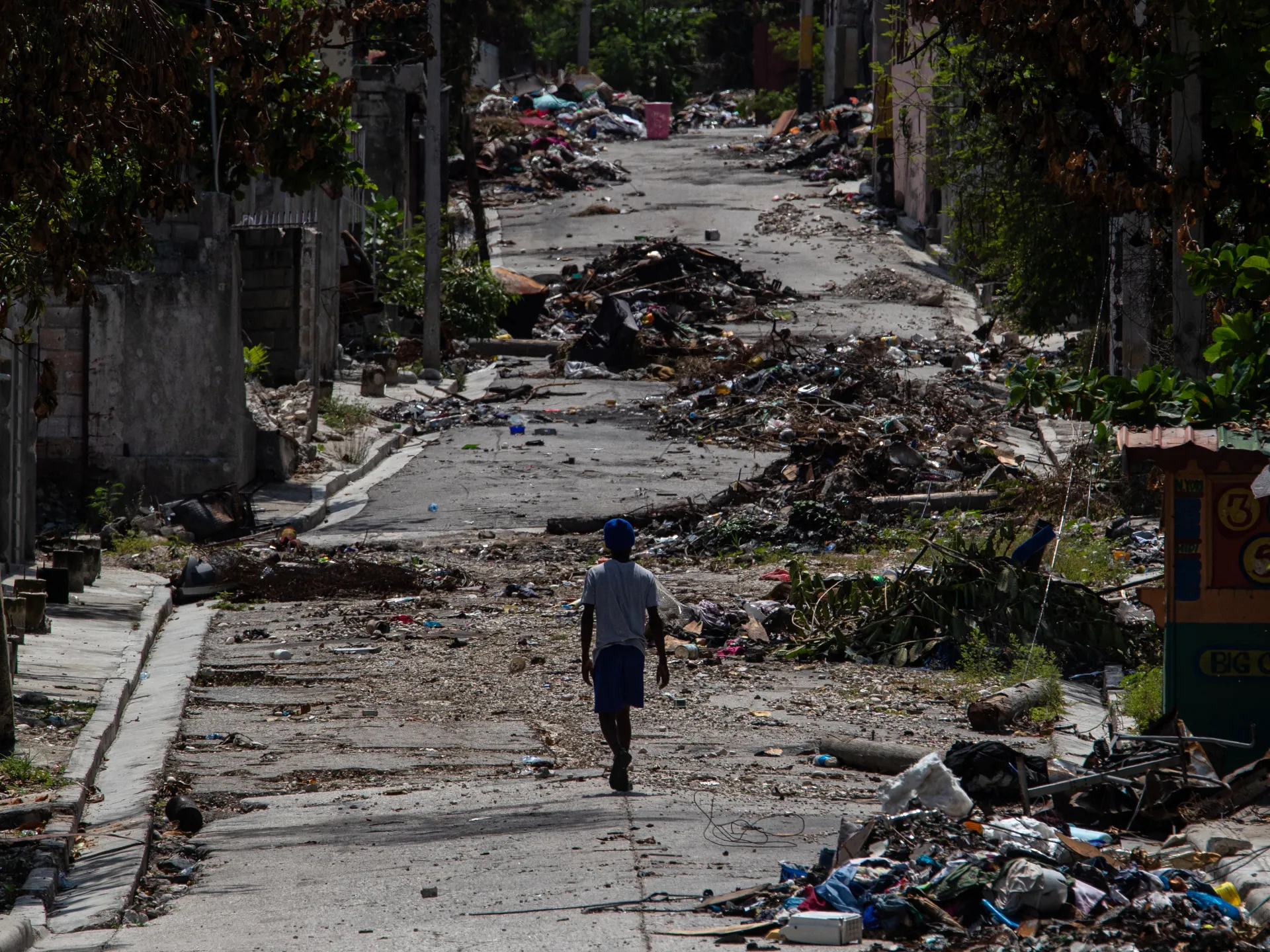How ‘election integrity’ could lead to voter suppression
Today we’re taking a tour through the mythical Land of Election Fraud, where President Trump has built a palace of lies, imprisoning both truth and democracy.
I put it in fairy tale terms because the idea that American elections are corrupt should hold about as much credence as a magical beanstalk growing into the sky. Countless lawsuits and investigations have found no proof of these false claims.
But here we are — not only do many Americans erroneously believe that Trump won the 2020 election, but the chief water-carriers of that lie are now in powerful government positions.
Last week, the U.S. Department of Justice announced that it will send monitors to Los Angeles and other locations in California and New Jersey for next week’s balloting. Those who study voting and democracies warn that this could be a test run for how far Trump could go in attempting to impose his will on the 2026 midterms and perhaps the 2028 presidential election.
If you think that it is harmless coincidence that he’s stacked election deniers in key posts, or that once again California is the center of his attack on democratic norms, I have beans you may be interested in buying.
“The sending of the observers to the special election could very well be, and probably likely is, a precursor or practice run for 2026,” Mindy Romero told me. She’s an assistant professor and the founder of the Center for Inclusive Democracy at USC’s Sol Price School of Public Policy.
Like others I spoke with, Romero sees a larger context to the poll monitors that has the potential to end with voter suppression.
“The Trump administration is laying a foundation, and they’re being very open about it, very clear about it,” Romero said. “They are saying that they are anticipating there to be fraud and for the election to be rigged.”
Trump put it even more clearly in a social media post on Sunday.
“I hope the DOJ pursues this with as much ‘gusto’ as befitting the biggest SCANDAL in American history!,” he wrote. “If not, it will happen again, including the upcoming Midterms. … Watch how totally dishonest the California Prop Vote is!”
To understand where all this may be headed involves digging back into Golden State history. The conspiracy underpinning election fraud claims has deep roots in California’s Proposition 187 — the anti-immigrant measure that was passed by voters in 1994 but squashed by the courts.
The far right never got over the defeat. Anti-immigrant sentiment morphed into conspiracy theory, specifically that undocumented folks were voting in huge numbers, at the behest of Democrats.
This absolutely loony bit of racist paranoia spawned an “election integrity” movement that cloaked itself as patriotism and fairness, but at heart remained doused in fear-of-brown.
Calfornia Atty. Gen. Rob Bonta said Monday he sees that Proposition 187 “playbook” at work today with “a targeting, unfortunately, of immigrants … because it creates fear in the eyes of some, in the minds of some, and it helps the Republican Party, MAGA and the Trump administration achieve their goals.”
Trump’s Immigration and Customs Enforcement raids are just the flip side of the coin to his election fraud claims — both at heart a part of the white Christian nationalism that his administration is now openly embracing.
Let me just say here that all Americans want fair elections and many average folks involved in election integrity efforts simply want to ensure our one-person, one-vote system stays honest — regardless of race or anything else. No hate on them at all. It’s the funders and organizers of many voter witch-hunt efforts that draw my ire, because they exploit that reasonable wish for fairness for their own dark agenda.
And that agenda increasingly appears to be the end of free and fair elections, while maintaining the appearance of them — the classic authoritarian way of ruling with the seeming consent of the people. Remember, Russia still holds elections.
“To have real control, you want to rule with a velvet glove,” Romero said. “That velvet glove can come off, and the people know it can come off,” but mostly, you want them to comply because it feels like “just what has to be.”
So how exactly would we get from poll monitors, a reasonable and established norm, to something as dire as an election that is rigged, or that is so chaotic the average person doesn’t know the truth?
It starts with introducing doubt into the system, which Trump has done. To be fair, with Proposition 50, the Election Rigging Response Act, Democrats now fear rigged elections, too.
But Gowri Ramachandran, the director of elections and security in the Brennan Center for Justice’s Elections and Government Program, told me her “biggest fear” is that those election deniers whom Trump elevated to official roles “now have the platform of the federal government.”
For that reason, “information about elections [that] comes out of the federal government right now, I think everyone’s going to have to take it with a really big grain of salt,” she said.
So we come out of the California 2025 special election unable to trust the federal government’s take on it, with one year until the midterm elections that will determine whether or not Trump’s power remains unfettered.
Maybe everything turns out fine, but there’s a string of other maybes where it doesn’t.
Let’s say Trump tries to declare an end to mail-in ballots and early voting, both of which increase turnout for lower-income folks who don’t have time to line up. Trump tried that earlier this year, though courts blocked it.
What does the 2026 election look like if you have to line up in person to vote if you want to be sure it counts, with ICE potentially around the block rounding up citizens and noncitizens alike? And the government requiring that you have multiple forms of identification, all with matching names (take that, married women), and even military “guarding” the polls?
Kind of intimidating, huh?
But let’s say the election happens anyway. And let’s say Republicans lose enough congressional seats to put Democrats in control of the House. But let’s say the federal government claims there is so much fraud, it has to be investigated before any results can be considered official.
Private groups sue on both sides. Half the country believes Trump, half the country believes the secretaries of state, like California’s Shirley Weber, charged with managing the results.
In that chaos, the newly elected Democratic representatives head to Washington, D.C., to get to work, only to have House Speaker Mike Johnson (R-La.) refuse to swear them in — no differently than he is currently doing with elected Arizona Rep. Adelita Grijalva, who has promised to vote to release the Epstein files if Johnson ever does his job.
Romero calls that scenario “not even … that big of a stretch.”
Congress comes to a halt, not enough members sworn in to function, which is just fine by Trump.
And voila! The vote is suppressed by confusion, chaos and the velvet glove, because of course it’s reasonable to want to know the truth before we move forward.
So monitor away. Watch the polls and watch the watchers, and protect the vote.
But don’t buy the beans.

